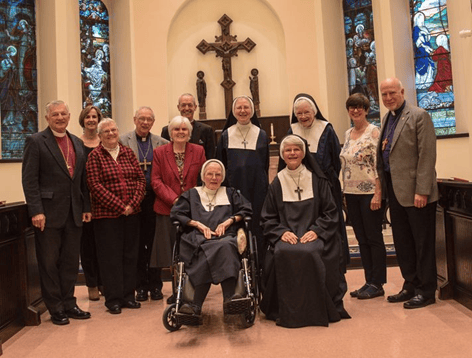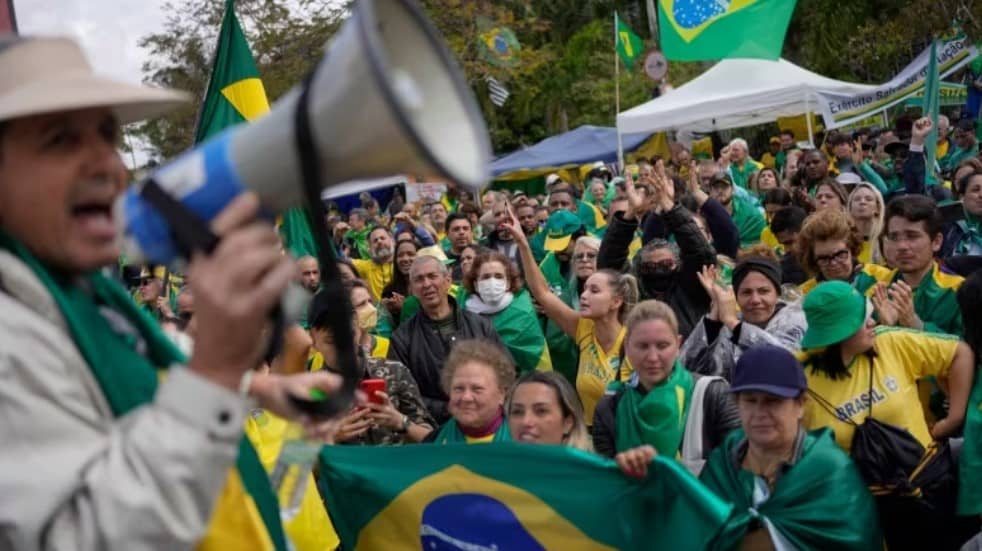CINCINNATI, Ohio — The storefront smells of fresh leather, glue and rubber, circulated into a mixture by the small industrial fan above the door.
An older man, a life-long Christian who worked with his parents in the cotton fields of the Jim Crow South, takes an unblemished pair of men’s soles and heels from a shelf.
He hands them to a younger man, smaller and bearded, who speaks no English beyond basic greetings, he says through an Arabic interpreter. He is a Muslim from Syria, a refugee displaced by his country’s civil war.
The men wear identical blue golf shirts and full-length aprons. The older man holds out a well-worn pair of dress shoes. With a thick, almost muscular right index finger the color of dark chocolate, he taps the heel and the sole, twice each. The Syrian man nods. From beneath the bills of their matching baseball caps, they make eye contact, smile and head toward opposite ends of Clarence Howell Shoe Repair.
The relationship of Clarence Howell, 78, and Bassam Osman, 36, is built on shared expertise in shoemaking and repair and shared experiences as outsiders looking for a safe place.
“When I met him, he reminded me of myself,” Howell said in a deep voice still dripping with rural Georgia after 57 years in Cincinnati.
Osman, the married father of now five children – the latest a U.S.-citizen son born earlier this month – came from the city of Aleppo, where war has claimed 31,000 lives and destroyed 33,000 buildings. He worked in a shoe factory before it was bombed.
Osman fled first in December 2011 to Turkey with a seriously ill daughter, before uniting his family in a United Nations camp there. After two years of intense vetting involving five interviews and document searches, the family arrived in July in Cincinnati.
Osman and his family members are among the 86 Syrian refugees resettled here since July 1, 2016, by Catholic Charities Southwestern Ohio. The agency celebrated World Refugee Day locally June 17.
The Osman family arrived six months before the Trump administration announced a ban that seeks to prevent most travel from Syria and six other predominantly Muslim countries.
The ban, almost all parts of which have been blocked by federal courts, also seeks to suspend the U.S. refugee program for 120 days. It was spelled out in an executive order called “Protecting the Nation from Foreign Terrorist Entry into the United States” that Trump signed Jan. 27.
Despite some strong opposition to Syrian refugees entering the country, Osman said he has experienced a positive reception here. “It is a very kind nation. In Turkey, my kids were called scavengers and dirty,” he said.
Howell can relate to name-calling and second-class citizenship. He grew up with it.
“If you met a white lady, you had to turn your head and look away, or they would hang you,” he said of his years in Georgia. “We had to sit upstairs in theaters. I remember being 11 or 12 when my mother was working in the fields. She said we couldn’t be playing when Mr. Charlie – he was the white man in the truck – drove past.”
So when a Catholic Charities volunteer introduced Osman and Howell in November, the shop owner decided to give him the same chance he received when he came to Cincinnati in 1960 and landed a factory job.
“I had to cross the same kind of line he had to cross,” Howell said. “I try to help people who gone through what I gone through. I know when you’re shuckin’ and jivin’ me. Bassam ain’t doing that. Some Jewish people helped me when I got here and didn’t hold nothing against me.”
Three hours a day in the shop turned to four and quickly to full-time work for Osman. Howell switched a former full-time worker to part-time to make room for him.
Osman’s salary rose from $9 an hour to $10 to $10.50 and finally to its current $11.
“He’s a hard worker. He’s very grateful. He gets the job done, He’s not lazy,” Howell said. “At 6 o’clock, the American workers stop, sometimes at 10 minutes of 6. Bassam is working at 6:20 to finish a job. He works fast. I have to tell him he doesn’t have to work so fast.
“I have nephews and grandkids who don’t work like that.”
Sometimes, Howell will fix one shoe and have Osman repair the other. “Never need to show him twice,” Howell said. “He can do everything I can do if I show him.”
Howell worked the front desk on a slow summer morning. Osman was in the back of the shop at a machine called a master finisher that resembles a standing, encased power sander. He inked and polished a new pair of men’s heels. He put the shoes on a shelf in front of a box fan to dry.
Osman’s job complements the web of supports he has received since resettling here.
The U.S. Conference of Catholic Bishops provides $1,075 for each refugee to use upon their arrival. Catholic Charities administers that money to help families set up a household.
The local Syrian American Foundation provided the Osman family with furniture for its Roselawn apartment. They attend services at the Islamic Center of Greater Cincinnati in West Chester Township.
He said his children’s teachers at Roselawn Condon School have helped them learn English and adapt to American culture. A Catholic Charities volunteer tutors them.
Osman saved enough to buy a used car. By the eighth month here, he had to start to repay the U.S. State Department for the airfare and travel loan.
For all of the assistance, most of Osman’s affection is directed toward Howell, whom he calls “Uncle” in English.
“He is a great man. I can tell he cares about me and my family,” Osman said.
Osman’s children decorated eggs during their first Easter season in the United States. They gave some to Howell.
“They love him, too. They run up to him and hug his legs,” said Osman, who smiled at the memory as he rubbed his thin, dark beard with his right hand. “My kids know I am happy when I come home from work.”
For all of his good fortune, Osman faces challenges. Two of his children, a son and his oldest child, a daughter, Zulekha, have Wilson’s disease. It is a rare inherited disorder that causes copper to accumulate to dangerous levels in the liver. They are treated with medication by doctors at Cincinnati Children’s Hospital Medical Center. Zulekha was twice misdiagnosed in Turkish hospitals with liver cancer and given chemotherapy. Another Turkish doctor said she needed a transplant.
Howell, a grandfather and the married father of three adult daughters, understands Osman’s need to be with his children at the hospital. Sometimes, visits can take four hours. The children will require lifetime treatment for the disease, which can worsen and have serious side effects.
No such complications exist at the shoe repair shop.
“The way he treats me, he makes me want to give 100 percent to him all the time,” Osman said. “We do not speak the same language. We know we love each other.”
Said Howell, matter-of-factly, “I feel like he’s a family member. I love him like he’s one of my brothers.”

















